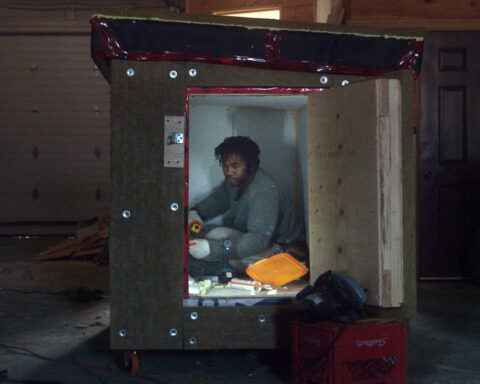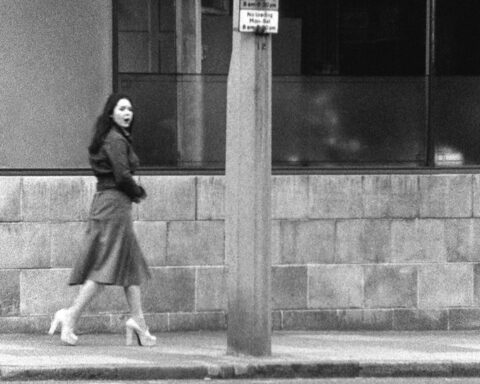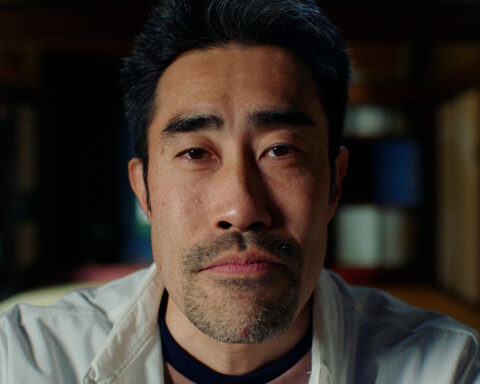I Had Nowhere to Go
(Germany, 100 min.)
Dir. Douglas Gordon
Programme: Wavelengths (North American Premiere)
The quotidian beauty of the footage comprising Jonas Mekas’ 2000 masterwork As I Was Moving Ahead Occasionally I Saw Brief Glimpses of Beauty is punctuated by beguiling intertitles and Mekas’ inimitable voiceover announcing, that “nothing happens in this film,” and even that “this is not a film.” For as much as Mekas’ love and support of American avant-garde cinema of all stripes is legendary, he has always been interested, in his own work, in playing down the role of the artist, breaking down cinematic artifice in pursuit of an elusive transparency into lived experience.
I Had Nowhere To Go, an adaptation of Mekas’ memoir by Turner-prize winning artist Douglas Gordon—he of the infamous Zidane: A 21st Century Portrait, the film that tracks French soccer great Zinedine Zidane’s every move throughout a full 90-minute match, culminating in a red card—is also interested in immediacy and artifice but takes a very different approach to it. Like Mekas’ own films, it’s structured around that voice, but in lieu of Mekas’ trademark home-movie footage, the vast majority of Gordon’s film takes place on a blank screen, filling out the artifice with an immersive V.R.-style soundtrack plunging the audience into the experience of war—advancing armies, planes flying overhead, bombs dropping—and the New York City streetscape, along with sonic collages whose programmatic purposes are less easily definable.
The result, though taking on similar questions, is strikingly different from Mekas’ aesthetic. This is not a gentle film. True, Mekas’ indomitable positivity imbues everything with a certain lightness, but the experience of blindness—interrupted only by rare, apparently unmotivated shifts to primary colours and teasingly ambiguous shots of a gorilla, a piano, a basket of root vegetables, trees blowing the wind—is overwhelming, all the more so as it is paired with deafening bombs scattered throughout the film that put you on edge, bracing for another. Juggling immediacy with distancing artifice, the film makes palpable the experiences of war and displacement and honours, like Joshua Oppenheimer’s masterpiece The Act of Killing, the epistemic barrier between here and there, now and then, us and them.
If I Had Nowhere To Go remains elusive where The Act of Killing is intensely, tangibly poignant, that ambiguity is a reflection of the complexity of Mekas’ experience. The film begins with Gordon prompting Mekas to recall the story of the first photograph he ever took. It’s 1940: the Russian army has just invaded Mekas’ native Lithuania and his brother has just given him his first camera. Excited by the advancing army, Mekas runs out in front of them and snaps a picture. A Russian officer snatches the camera away, rips out the film, and then, astoundingly, gives the camera back and sends Mekas home. Another mantra in As I Was Moving Ahead… has Mekas insisting that he is a happy man, and in episodes with his wife and daughter, visiting friends like Stan Brakhage, or lazing around in Central Park, his life can seem almost impossibly blissful. The notion that somebody who survived the horrors of World War Two could consider themselves to have had a charmed life seems absurd, but maybe that formative experience offers the key to understanding him.
It also helps to explain Gordon’s provocative aesthetic conceit. Mekas has often, including in I Had Nowhere To Go, equated memory with film: he says he has little memory of the people he knew in Lithuania because he didn’t film them. Subsequently, Mekas has spent a lifetime rectifying this situation by documenting absolutely everything, from family to friends to walks in the park to philosophical musings. The film’s blindness mirrors Mekas’ amnesia.
The final result is a three-voice counterpoint offering disparate perspectives on an elusive central object. Visually, the film evokes Mekas’ experiences; the voiceover relates his story and philosophical bent; and Gordon’s immersive sound design speculates, editorializes and contextualizes around the narrative.
The intensity of the resulting experience shouldn’t be understated: the friend I saw it with, a film aficionado if ever there was one, walked out in disgust at what he saw as the film’s superficial, manipulative technique, likening it to a sensory deprivation chamber. I disagreed with his value judgment, but was left wondering what exactly the film added up to.
What were the three voices are really talking about? Is it Mekas? It’s hard to say that the film really offers anything new about him. Is it an experiment in expanded cinematic formalism? That is closer, I think—the film departs from Mekas’ innovations to produce a novel experience. Could it be about the migrant condition generally: the defining geopolitical spectacle of both the post-WWII and post-Arab Spring years? Now we’re nearing the mark.
Really, I think it’s about the nexus of all three. It seems as though, expanding on Mekas’ quip that the villain in his life is the twentieth century along with the man’s oft-remarked upon longevity, Gordon is ultimately drawing a link between Mekas’ life, themes and techniques and the nature of life and perception in the 21st century. The film mirrors the confusion and fear we feel and the loss of agency and suffering we experience in the face of the world’s violence and inequality, all of which is somehow, briefly, assuaged by glimpses of beauty that grant liberating, conscience-clearing amnesia. The film is as ambivalent as the times.
The film’s title crystallizes this epistemic and affective equivocation, signifying two contradictory meanings. One would be forgiven for assuming that “I had nowhere to go” was the anguished recollection of the experience of displacement. In fact, the line comes in an episode when Mekas has already arrived in New York. The screen, as usual, is blank. Mekas is wandering around Manhattan, looking in shop windows, ending up on Broadway. He’s walking slowly, taking it all in—he hasn’t come all this way not to experience the glory of America to its fullest. That’s why, he tells us, “I had nowhere to go.”











